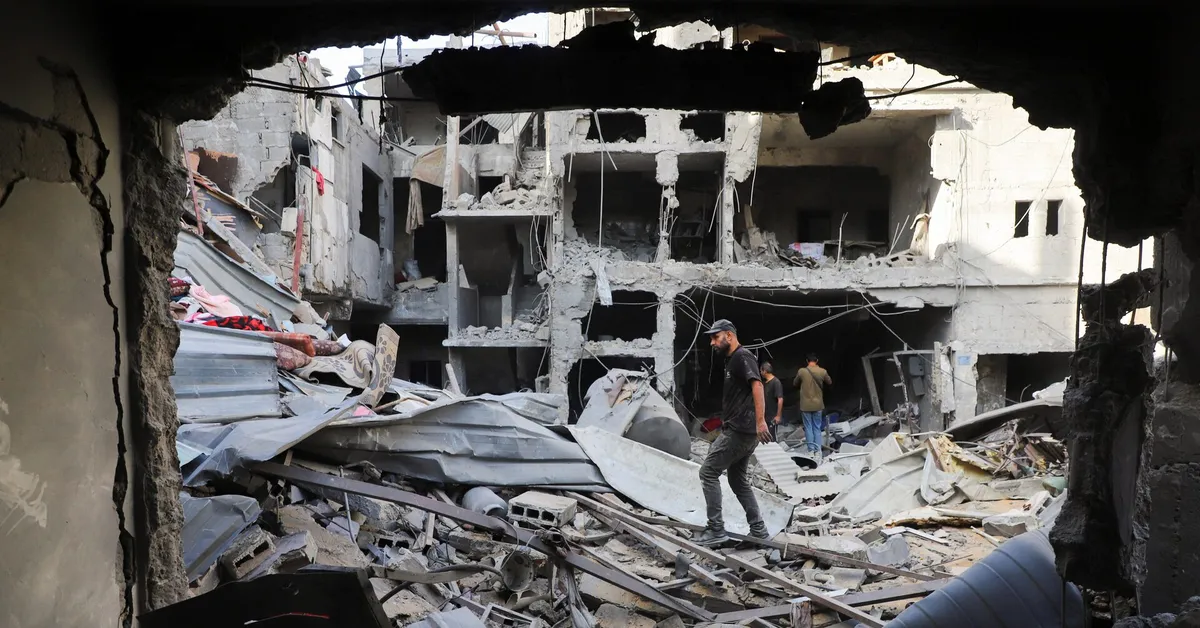
In the early hours of Sunday morning, Israeli planes and tanks launched a series of airstrikes across the Gaza Strip, leading to the destruction of multiple residential buildings. Witnesses reported that these attacks continued throughout the night, exacerbating the already dire humanitarian situation in the region. As the violence escalates, many Palestinians are pinning their hopes on a U.S. peace plan aimed at ending the ongoing conflict.
On Saturday, U.S. President Donald Trump took to his Truth Social platform to announce that Israel had tentatively agreed to a withdrawal line within Gaza. He stated that a ceasefire would be implemented immediately once Hamas confirms this agreement. This development came as Egypt prepared to host delegates from Hamas, Israel, the United States, and Qatar to discuss the most comprehensive effort yet to halt the conflict.
Local health authorities in Gaza reported that at least 16 Palestinians were killed by Israeli fire on Sunday alone. Among the deceased were four individuals seeking aid in southern Gaza and five others who lost their lives in an airstrike in Gaza City. Shadi Mansour, a distraught father, recounted the loss of his 6-year-old son, Ameer, who was killed in an airstrike in the Tuffah suburb of Gaza City. "The targets of the Israeli army are children," Mansour lamented, highlighting the devastating impact of the conflict on civilian lives.
The ongoing military operations have led to a growing sense of frustration among Palestinians, many of whom have witnessed multiple ceasefire attempts fail since the war began two years ago. Ahmed Assad, a displaced resident of central Gaza, expressed his disillusionment with the recent announcements. "Unfortunately, there is no translation for this on the ground," he said, voicing his uncertainty about what actions to take amidst the chaos.
As the international community watches closely, Egypt is set to facilitate discussions aimed at resolving outstanding issues between Hamas and Israel. Hamas has shown a willingness to accept key elements of Trump's 20-point peace proposal, which includes an end to the war and the release of hostages. However, uncertainties remain regarding Hamas's potential disarmament, a crucial demand from Israel for any peace agreement.
In a sign of Israeli optimism regarding the potential for peace, the Israeli shekel soared to a three-year high against the dollar, and Tel Aviv's stock market reached an all-time high. Residents in Tel Aviv expressed cautious optimism, with some stating that Trump's involvement has instilled hope in the region. "It's the first time in months that I'm actually hopeful," said local resident Gil Shelly.
Domestically, Israeli Prime Minister Benjamin Netanyahu faces increasing pressure to conclude the conflict. Families of hostages and a war-weary public are demanding action, while hardline coalition members insist on continuing military operations. Far-right Finance Minister Bezalel Smotrich cautioned against halting attacks on Gaza, emphasizing the complexities within Netanyahu's coalition.
Under Trump's proposed plan, all Israeli hostages, both alive and deceased, would be released. Israel claims that 48 hostages remain in captivity, 20 of whom are alive. However, logistical challenges complicate this process, as sources close to Hamas indicated that retrieving deceased hostages amidst the devastation of Gaza would take longer than expected.
As the situation in Gaza continues to evolve, the international community watches closely for signs of progress. Trump's assertion that Hamas is ready for a lasting peace adds a layer of complexity to the ongoing negotiations. With Israeli airstrikes continuing in response to the October 7, 2023, Hamas-led attack, the path to peace remains fraught with challenges. It is essential for all parties involved to engage in constructive dialogue to bring an end to the violence and restore stability to the region.